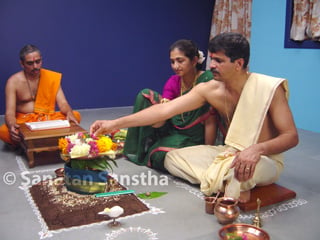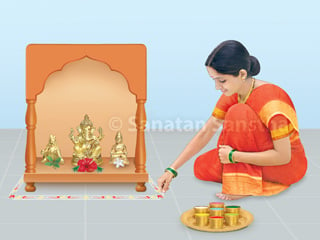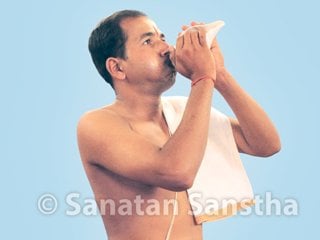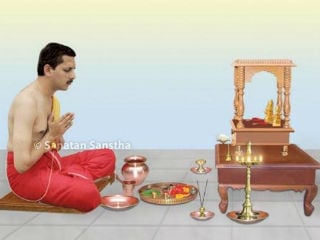Bathing is elimination of the covering of Earth frequencies and Tama component around the gross and subtle bodies. A spiral of Apa-tattva (Absolute Water Principle) is formed around the individual after a bath. This spiral is charged with Sattva particles and hence it becomes easier to attract the Principles of Deities on the strength of this sattvikta (Purity). After a bath, the capacity of an individual to imbibe the Chaitanya (Divine consciousness) emanating from Deities increases. This Chaitanya can then remain active throughout the day.
The Raja-Tama components within the body of an individual reduce due to bathing and then the individual can easily receive the Divine frequencies being transmitted in the atmosphere. Similarly, the surrounding environment becomes stable following a bath. Therefore, while performing the Puja an individual can turn its mind inwards and can easily become one with the surrounding environment. Besides, it can imbibe the frequencies of Deities with the help of conduciveness of the atmosphere.
1. Where to bath ?
Whenever possible, the pujak (Worshipper) should bathe at water reservoirs such as a river, lake, well etc. Bathing in natural surroundings helps purify the body with the help of Panchatattvas (Five Cosmic Elements). This disintegrates the Raja-Tama in the body to a large extent. The various bodies of the individual, like the Prandeh (Vital body), Manodeh (Mental body), Karandeh (Causal body) and Mahakarandeh (Supracausal body) get purified and can readily receive sattvikta. To a certain extent, the pujak is able to imbibe the Nirgun (Non-materialised) Shakti (Divine Energy) and Principle of superior Deities. Besides, as his immediate environment comes into contact with the Universal atmosphere, he can also imbibe and emit some Principles from the Universal atmosphere through the medium of the body.
This explains why priests advise us to bath in a Holy river or lake when we go to a place of pilgrimage to perform some rituals.
2. A true bath (cleansing)
A. न उदकाक्लिन्नगात्रस्तु स्नातः इत्यभिधीयते । – महाभारत, 13.111.9
Meaning : Only wetting oneself externally does not amount to bathing. The one who has bathed in water controlling his senses, is pure both externally and within. – Mahabharat, 13.111.9
B. The process of removal of dirt from the body and antahkaran (The inner sense organs consisting of the conscious mind, subconscious mind, intellect and ego) is known as a ‘bath’; hence, performing constant Sadhana (Spiritual practice) is the true bath.
3. Starting Puja within one hour of bathing
The increased sattvikta as a result of the bath slowly reduces due to the constant attack of Raja-Tama in the environment. This reduces the benefit of bathing. Hence, the Puja should be commenced within one hour of bathing.

 What are the benefits obtained from Puja preparations?
What are the benefits obtained from Puja preparations? Importance of drawing Rangoli as a part of Puja preparations
Importance of drawing Rangoli as a part of Puja preparations Sounding of a conch at the commencement of a puja
Sounding of a conch at the commencement of a puja Why are kalash, conch, bell and lamp worshipped before puja ?
Why are kalash, conch, bell and lamp worshipped before puja ? Importance of applying tilak or bhasma by the pujak while performing Puja
Importance of applying tilak or bhasma by the pujak while performing Puja Clothes to be worn by men and women while performing Puja
Clothes to be worn by men and women while performing Puja